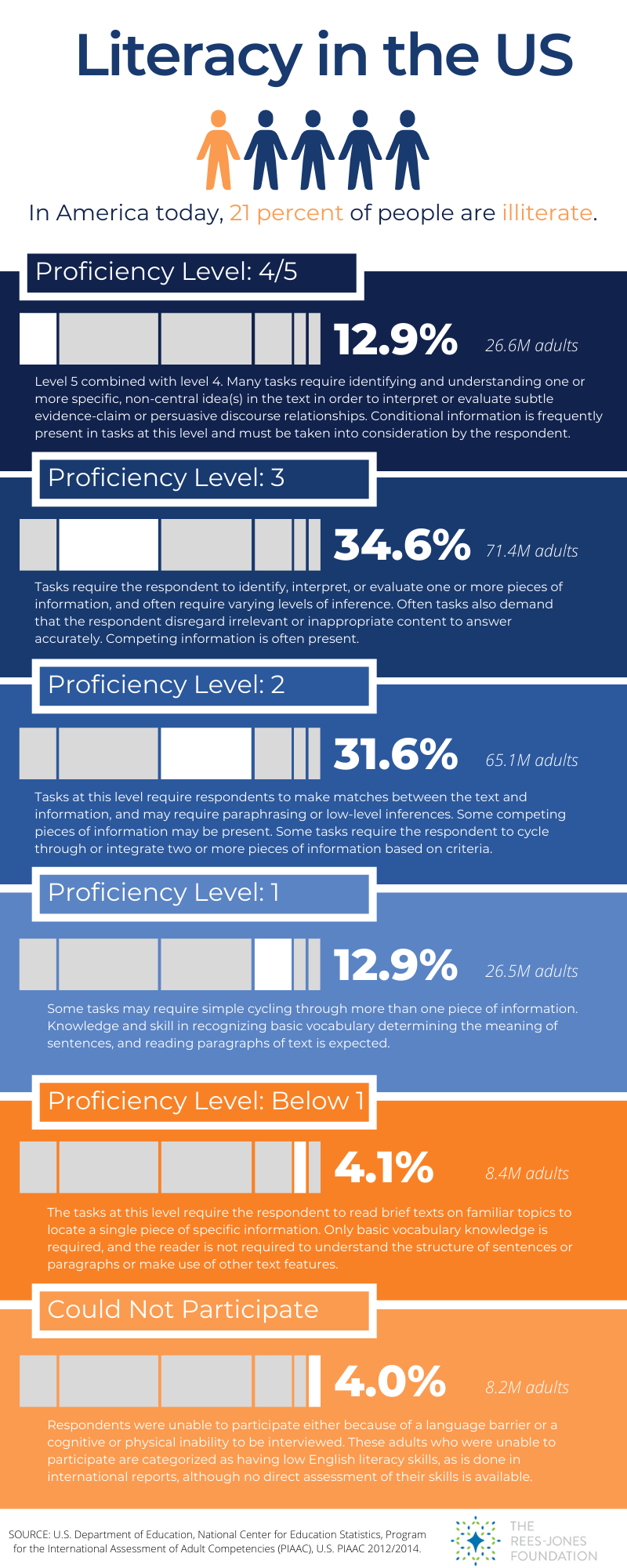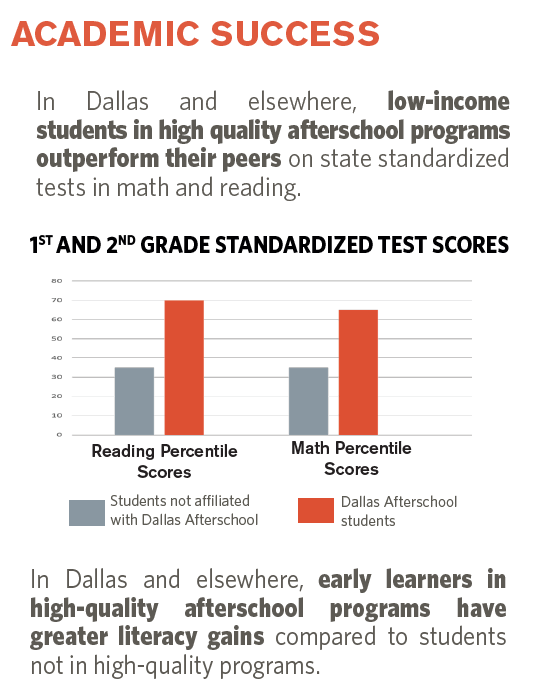World Book Day Underscores Importance of Reading – Especially for Children
April 23 Encourages Reading – The Most Crucial Academic Skill
By CJ Stevenson, Communications Specialist at The Rees-Jones Foundation
Each year, World Book Day is celebrated on April 23. The United Nations Educational, Scientific and Cultural Organization, or UNESCO, proposed World Book Day as a day of celebrating the joy of reading for enjoyment.
I personally credit my love of reading to my elementary school librarian Mrs. Lamb. During our weekly library visits, Mrs. Lamb would spend part of the time reading aloud to us. We would pick up a chair cushion, and all cram onto the hand-made, wooden steps tucked into a corner of the library – Mrs. Lamb’s little auditorium. Mrs. Lamb wouldn’t read from a silly children’s book, no, she chose novels like Because of Winn-Dixie and Bud, Not Buddy, reading a chapter to us each week. Imagine 20 little seven-year-olds silently sitting, completely enthralled while from her cloth recliner in front of us, Mrs. Lamb would transport us to another world.
It’s been a long time since I thought about those days despite how much they shaped my life. Reading was my introduction into storytelling, and that love of storytelling is why I pursued a journalism degree and a career in communications. But more rudimentary than that, my love of reading empowered me to become a better reader, a better student, and ultimately, enabled me to graduate high school and continue on to higher education.
Literacy among DFW Children
The sad fact is that countless children are not presented with the same opportunity to build reading proficiency, which is the most crucial academic skill because reading is the foundation for learning. Children are learning to read through third grade. After third grade, students are reading to learn.
A lack of reading comprehension skills has far-reaching consequences for students and society.
According to Nation’s Report Card, in 2019 only 18.5 percent of fourth grade students in Dallas and Fort Worth ISDs were reading proficiently. Reading proficiency decreased to 13.5 percent for eighth graders in the two districts. Proficiency is a higher standard than “grade-level,” representing the goal for what all students should know, according to the National Assessment of Educational Progress (NAEP).
With learning difficulties due to COVID-related complications, the lack of reading proficiency has been exacerbated. DISD released data showing that 30 percent of all third through 11th grade students experienced some reading related learning loss since March 2020.
This does not bode well for these students’ future.

SOURCE: U.S. Department of Education, National Center for Education Statistics, Program for the International Assessment of Adult Competencies (PIAAC), U.S. PIAAC 2012/2014. Graphic by The Rees-Jones Foundation.
Without intervention, childhood illiteracy follows us into adulthood. In America today, 21 percent of people are illiterate. The National Center for Education Statistics (NCES) at the U.S. Department of Education defines literate as “the ability to understand, evaluate, use and engage with written texts to participate in society, to achieve one’s goals, and to develop one’s knowledge and potential”.
The NCES used data from the Program for the International Assessment of Adult Competencies to determine literacy rates in the U.S. among adults age 16 to 65. It found that one in five adults (21 percent) do not have English literacy skills sufficient to complete tasks that require comparing and contrasting information, paraphrasing, or making low-level inferences. Further, 8.4 million adults in the U.S. (4.1 percent) are considered functionally illiterate in English – meaning they are unable to successfully determine the meaning of sentences, read relatively short texts to locate a single piece of information, or complete simple forms.
Literacy Solutions
A student who grows up in poverty and cannot read on grade-level by the end of third grade is 13 times more likely to drop out of high school than his or her wealthier peer.[i] In today’s competitive job market, a high school diploma or GED is vitally important.
Literacy programs available after-school and during the summer can help thousands of children build the necessary reading comprehension skills.

Students participating in after-school programs outperform their peers (Data provided by Dallas Afterschool).
Out-of-school-time programs have a tremendous impact on reading skill retention. Low-income students in high quality after-school programs outperform their peers on state standardized tests in math and reading, a study by SMU found, and students in high-quality after-school programs have greater literacy gains compared to peers not enrolled in such programs.
The Rees-Jones Foundation endeavors to provide children that lack the opportunity to build critical reading or language skills with support through another avenue, such as an after-school or summer literacy program.
Literacy Programs in DFW
The Rees-Jones Foundation is working to promote childhood literacy and mitigate learning loss by supporting reading programs that intervene early, teach foundational literacy skills, remediate when necessary, and support the ongoing reading comprehension and education of young children, especially those living in poverty, and/or impacted by an intellectual disability.
The Foundation has supported, among others, the following organizations that seek to prepare school-age children for lifelong success through their child literacy programs.
Early Matters Dallas
Early Matters Dallas is a community initiative that launched in 2015 to address early learning in Dallas County. It is a combined effort of community leaders, nonprofit organizations, business leaders, and school districts.
Together as a coalition, Early Matters Dallas prioritizes certain areas of involvement in pre-k, seeking to increase access to pre-k, boost parental demand for pre-k, improve classroom quality, and extend the continuum of care regarding community resources to support children.
The overarching goal is to increase the percentage of third-graders reading on grade level as the district works toward an important goal of 60 percent of third-graders reading on grade level by 2025.
Beacon Hill Preparatory Institute
Charnella Derry founded Beacon Hill in 2006 after reading about the increasing education and opportunity gap among minority and low-income students. As a child of educators, Derry felt compelled to do something about it. Beacon Hill prepares children for a life of success by providing struggling students with early childhood education, enrichment activities and specific academic interventions.
The goal of Beacon Hill’s tutoring program is to get all participants at grade-level reading proficiency. It accomplishes this via small-group tutoring (3:1 and 4:1 ratios) for grades PK4-12 through in-school, after-school, and summer programs targeted at low-performing schools and their students in Dallas and surrounding communities. Student tutoring is supplemented with parent education, college preparation (for participants in grades 9-12), and enrichment activities.
Additionally, Beacon Hill is one of four partners in the DISD Read Up Collaborative that is tackling the learning loss and reading struggles highlighted and exacerbated by the COVID pandemic.
Catch Up & Read
Catch Up & Read was founded in 2009 with a singular focus to catch at-risk elementary students up to grade-level reading by third grade. It has successfully implemented a two-pronged strategy to narrow the learning gap for at-risk children and to deliver equitable education for all.
Catch Up & Read provides teacher-directed, after-school interventions and instruction for the lowest-performing reading students in a school, and delivers time-tested, research-based, teacher training in literacy instruction. This strategy matches the best-equipped teachers with the lowest-performing students to maximize student learning that ultimately impacts the entire school’s learning environment and culture.
Catch Up & Read is also a partner in the DISD Read Up Collaborative.
[i] Double Jeopardy: How Third Grade Reading and Poverty Affect High School Graduation, https://files. eric.ed.gov/fulltext/ED518818.pdf
Share this post:
Category: Original Content
Remember to Whom We Belong By T. Hardie, President For to us a child is born, to…
Children’s Health and UT Southwestern Break Ground on New Dallas Pediatric Campus; Announce $100 Million Donation from…

